ROBERT WILLIAMS BUCHANAN (1841 - 1901)
|
ROBERT WILLIAMS BUCHANAN (1841 - 1901) |
|
|
|
|
|
|
|
|
RANDOM CUTTINGS ii
Aberdeen Evening Express (23 March, 1894 - p.2) THE VICISSITUDES OF A NOVEL. The “Daily News” has been drawing attention to the strange circumstances which attended the early career of Mr R. E. Francillon’s powerfully interesting novel “A Dog and his Shadow,” now re-issued by Messrs Chatto & Windus. “A Dog and his Shadow” first appeared as a serial in the “Gentleman’s Magazine.” It was to have been called “A Beggar on Horseback,” but it was discovered that Mr James Payn had already made use of the title. The remarkable part of it was, however, that Mr Payn had himself been anticipated by somebody else, and was obliged to alter the name of his story on its coming out in volume form. Shortly after the publication of “A Dog and his Shadow” in three volumes, a fire on the premises of Messrs Grant and Co., the publishers, destroyed the whole stock of copies, and thus annihilated the work for the time being. Another little vicissitude unmentioned by the “Daily news” is that by a strange chance “A Dog and his Shadow” ran as a serial in company with Mr Robert Buchanan’s “The Shadow of the Sword,” thus giving two “shadows” to the fiction in the magazine. After being dogged by so many shadows, Mr Francillon’s novel ought to obtain some merited sunshine. ___
The People (26 August, 1894 - p.2) |
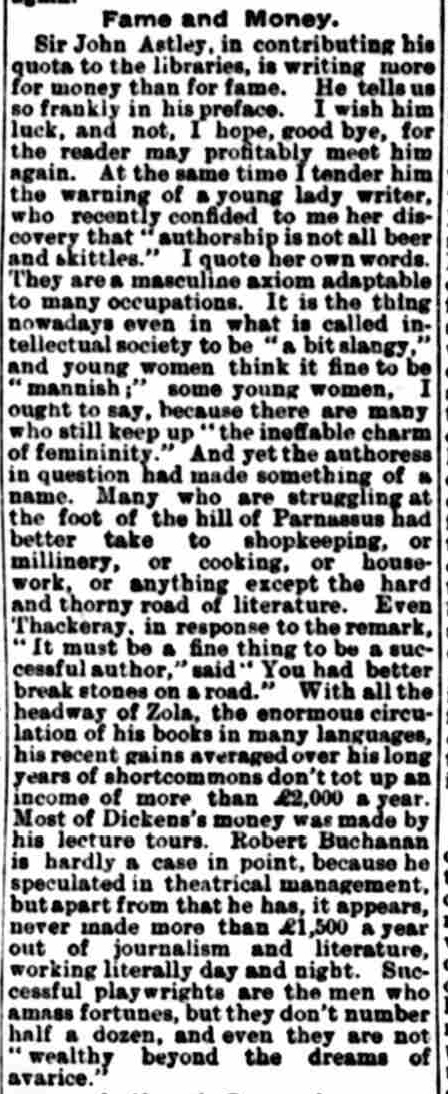 |
|||||||||||||
|
The Nottingham Evening Post (23 January, 1895 - p.2) Looking down the list of prices obtained at the sale of the late Mr. Edmund Yates’s “literary effects,” if the phrase may be so used, one is struck by some odd discrepancies in the estimated value of the various objects as indicated by the prices obtained. The famous Dickens writing slope, with its silver plate and inscription, described “as a common looking thing worth perhaps half a crown,” was sold for £105, though one would have thought more interesting souvenirs of Dickens might have been secured for less money. The whole of the Dickens relics sold well, however. The “edition de luxe,” in 30 volumes, fetched £34; the first edition of “Sketches by Boz” made £11.15s.; and a copy of “The Tale of Two Cities,” first edition, presented by Dickens to Yates, with the author’s inscription on the title page, went for £11.10s. Because furnished with the attraction of Dickens’s autograph, copies of “The Uncommercial Traveller” and “Great Expectations,” otherwise unimportant, were sold for £4 and £5 respectively. Eighty-six pounds was paid for the album containing a selection of Dickens’s letters to Yates, and perhaps it was worth the money, though many will be sceptical on the point. Amongst the other prices realised it may be noted that while a first edition of Sir Edwin Arnold’s poems fetched a couple of guineas, two of Mr. Robert Buchanan’s early volumes, both first editions, and one containing an inscription from the author, made only three shillings between them. It would be interesting to have the opinions of Mr. Buchanan on this last transaction. ___
The Leeds Times (26 January, 1895 - p.4) |
|||||||||||||
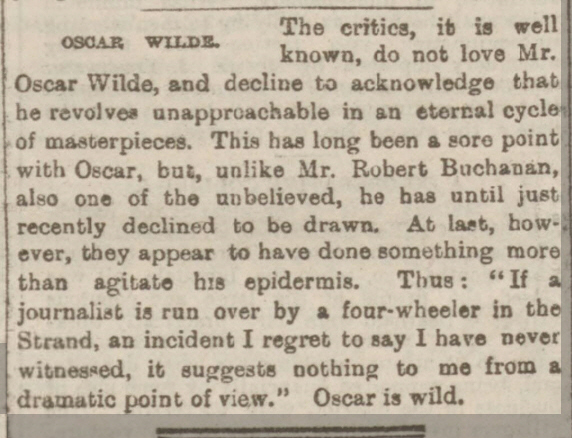 |
|||||||||||||
|
The Gloucester Citizen (18 March, 1895 - p.3) |
|||||||||||||
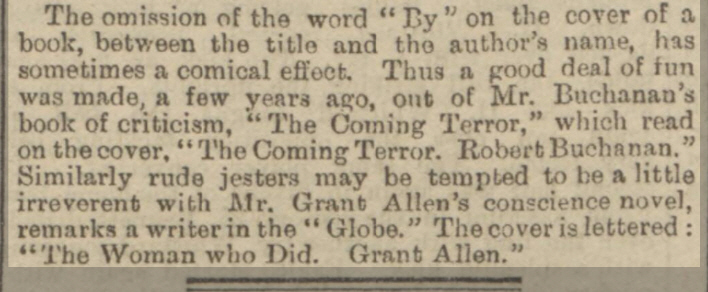 |
|||||||||||||
|
The Aberdeen Journal (1 February, 1896 - p.6) |
|||||||||||||
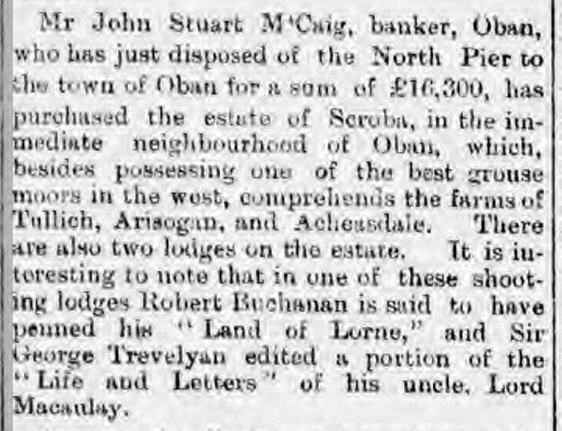 |
|||||||||||||
|
The Aberdeen Journal (10 February, 1896 - p.6) |
|||||||||||||
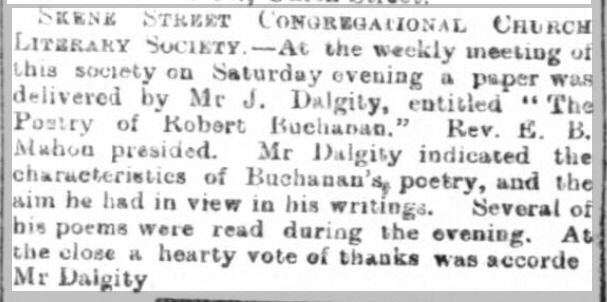 |
|||||||||||||
|
The People (26 April, 1896 - p.2) CIGARETTE PAPERS. BY JOSEPH HATTON. . . . ... And if in these days publishers take to writing their own books, there is no reason why authors should not become their own publishers. Mr. Robert Buchanan is setting the example. He makes a bold start, too. His first list of books is quite formidable. I heartily wish him success. He has had a bad time of it lately, but as one of his friends says, “he is such a harbitrary gent.,” a remark far more applicable to Forster who inspired it. ___ Punch (9 May, 1896) |
|||||||||||||
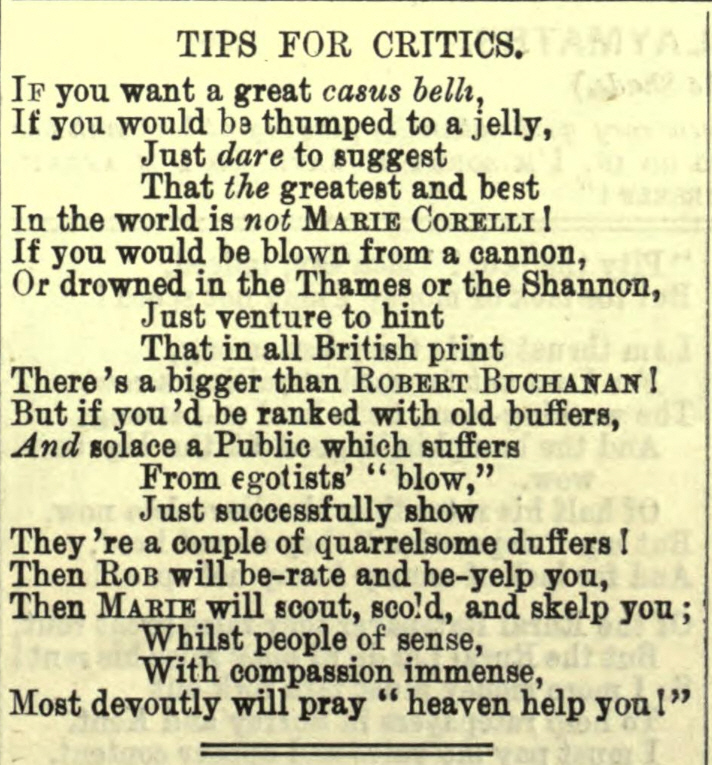 |
|||||||||||||
|
The Glasgow Herald (7 September, 1896 - p.9) Mrs Patrick Campbell has been confiding to the irrepressible interviewer the fact that her maiden name was Beatrice Stella Tanner. She might have added that under this name, during the principalship of Mr Weist Hill, she was a student at the Guildhall School of Music. She acted in private theatricals, but her first professional appearance on the stage was a Mrs Linn Loseby in a play called “Bachelors,” by Messrs Herman Vezin and Robert Buchanan, at Liverpool, in September, 1888. There seems, however, to be some mistake about the date. I cannot trace any such performance at the period mentioned. ___
The Era (3 October, 1896 - p.13) An extract from a long piece by Clement Scott entitled ‘Come Out Of Your Hole, Rat!’ wherein he berates an anonymous attacker - not Buchanan, who is described below: |
|||||||||||||
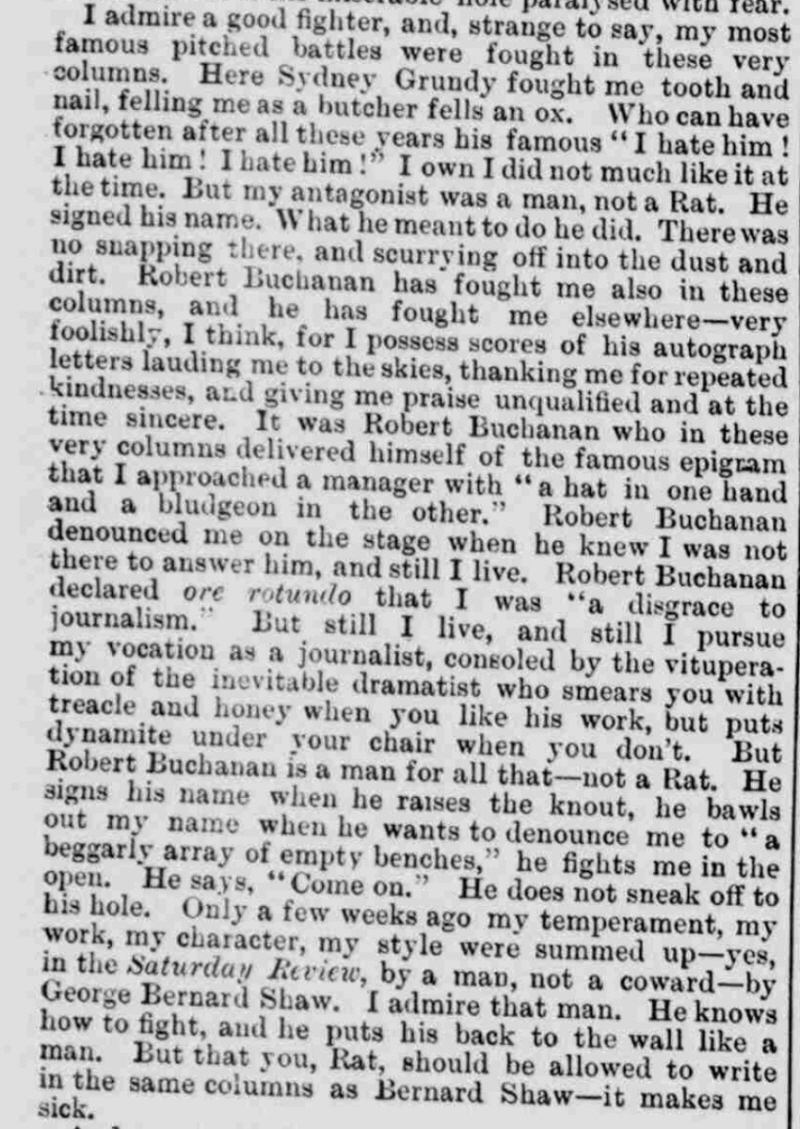 |
|
The Globe (30 January, 1897 - p.6) |
|||||||||||||
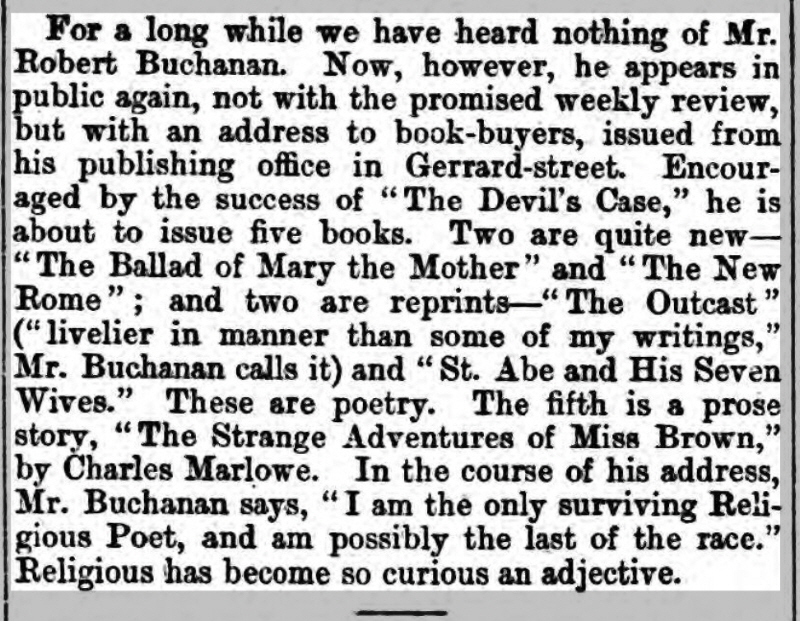 |
|||||||||||||
|
The Aberdeen Weekly Journal (10 February, 1897 - p.3) Mr Robert Buchanan says:—“There was a time when Scotland had brains of its own; now its culture seems only a weak reflection of the rushlights of Clapham.” ___
The Dundee Evening Telegraph (4 May, 1898 - p.2) It is not generally known that Mr Robert Buchanan is not Scotch by birth. He saw the light in Staffordshire nearly 57 years ago. ___
The Greenock Telegraph and Clyde Shipping Gazette (7 February, 1899 - p.3) Sacrilegious Mr Robert Buchanan calls The Times a “disreputable and time-serving old barrel organ.” The Times’ candid opinion of Mr Buchanan would be interesting. ___
The People (5 March, 1899 - p.2) CIGARETTE PAPERS. BY JOSEPH HATTON. |
|||||||||||||
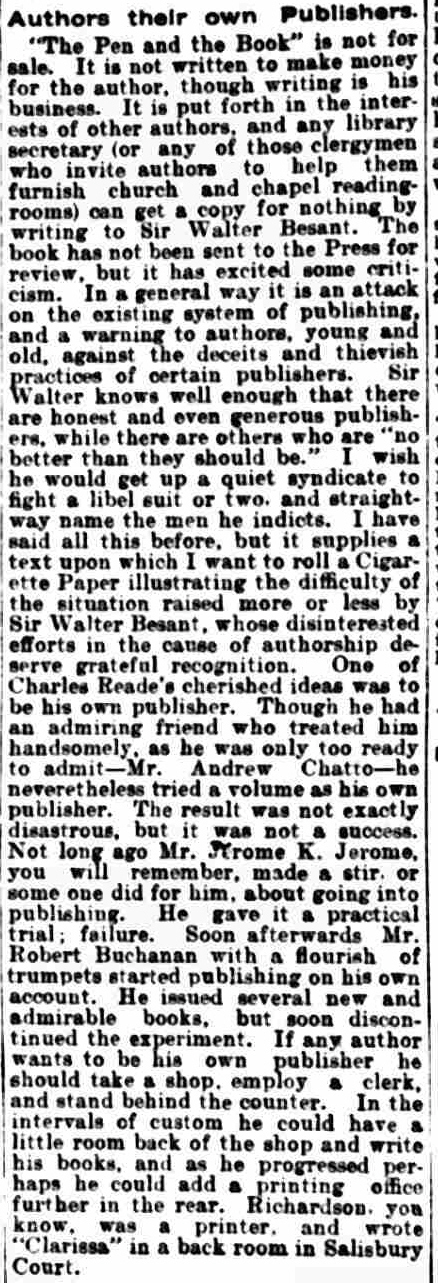 |
|||||||||||||
|
The Yorkshire Evening Post (21 June, 1899 - p.2) WHAT DO SCOTSMEN SAY TO THIS? Mr. Robert Buchanan in one of his latest articles says he would rather have spent an hour with Burns than a month with Wordsworth. He continues: “The point for which I contend is that all Scotsmen must feel exactly as I do, or Burns never would have secured such a hold on their pawky souls. They like women, they like whisky, they like tumbling in the hay, and more power to them for doing so!” ___
The Glasgow Herald (11 August, 1900 - p.7) Mr Robert Buchanan’s “Father Anthony,” of which seven large editions have already been sold, is being issued in a sixpenny edition. Mr. Long, who is the publisher, is printing an edition “limited to 100,000 copies.” ___
The Dundee Evening Telegraph (10 September, 1900 - p.6) ROBERT BUCHANAN’S WITTY RETORT. — Mr Robert Buchanan, the eminent novelist, was once asked by a brother author if he knew what it was to suffer from sleeplessness, says “The Gem.” “Suffer from sleeplessness?” uttered Buchanan, in a surprised manner, “no, indeed! I can always sleep when I want to do so.” “Ah, lucky man!” replied his friend. “How do you manage that?” “Why,” replied Buchanan, solemnly, “whenever I feel that I must have sleep, I take up one of your books, read one chapter, then I feel drowsy; if I read two chapters, I am off into a dead slumber. I have never attempted to read three, for, goodness knows, that might prove dangerous!” We are not told whether Mr Buchanan’s friend ever adopted the same method of curing insomnia or not. ___
The Dundee Courier (26 September, 1900 - p.7) Dr Archibald Stodart Walker, the nephew and literary executor of the late professor John Stuart Blackie, publishes this week a sociological study entitled “The Struggle for Success,” and has in the press “The Rectorial Addresses delivered before the University of Edinburgh,” and a book entitled “Robert Buchanan, the Poet of Modern Revolt.” Mr Grant Richards is the publisher of these, and will probably also publish an important and interesting work which Dr Stodart Walker is preparing, namely, “The Day Book of John Stuart Blackie,” in which is reflected in a striking manner the broad catholic judgment, the wise forethought, and the scintillating wit of the Professor. ___
The Glasgow Herald (4 October, 1900 - p.4) [A review of the Archibald Stodart Walker book referred to above, “The Struggle for Success”, is available below. It contains the following sentence: ‘As for Christianity, he evidently has some sympathy with the view, expressed by Mr Robert Buchanan in “The Ballad of Mary the Mother,” that Jesus of Nazareth was the grand atheist.’] |
|||||||||||||
 |
|||||||||||||
|
The Dundee Evening Telegraph (24 November, 1900 - p.4) HOW ROBERT BUCHANAN PURCHASED A DINNER. “The sad illness of that sturdy veteran of letter, Mr Robert Buchanan, recalls to me,” writes a literary correspondent, “an amusing story of his younger days which I once heard him tell. Hitherto it has not found its way into print. Like many well-known literary men, Buchanan’s ‘beginnings’ were full of stress and struggle, and, as he confessed in your autobiographical columns, the res angusta domi was ever present. he had just published one of his early novels when one day he found himself the possessor of a fine appetite, but without any money in his pocket at the moment to get a meal. He thought of ways and means for some time, and finally hit upon an idea. He went to the office of his publisher, and asked for three copies of his new novel, directing that the cost should be placed to his account. Armed with the fresh, nicely-bound volumes, he immediately sought out the nearest second-hand bookseller, and disposed of the copies for as much as they would fetch. ‘I remember I enjoyed that dinner tremendously,’ he said, in that merry, yet rather tired voice we all hope to hear again. ‘It proved to my entire satisfaction that even the humblest author could live by his books!’” ___
The Oban Times (15 June, 1901 - p.5) |
|||||||||||||
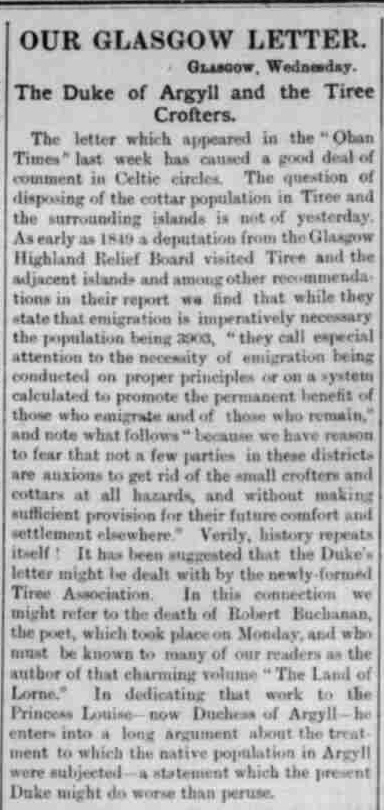 |
|||||||||||||
|
From The Current Encyclopedia (Vol. I. No. I. July 15, 1901.) |
|||||||||||||
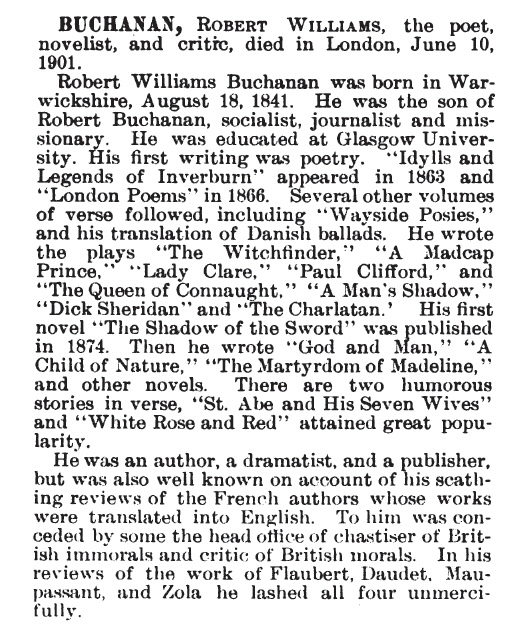 |
|||||||||||||
|
The Aberdeen Weekly Journal (11 December, 1901 - p.10) [From the ‘Readers & Writers’ column by J. Cuthbert Hadden.] I came across a charming dedication the other day. It read: “To my wife—a good woman.” This suggests that wives are not always good women, as to which, being a Benedict, I have no opinion to offer. But the thought occurred to me what an interesting article might be written about authors’ dedications. The wives would bulk largely. Coventry Patmore, you remember, inscribed the poem by which he is best known “To the memory of her by whom and for whom I became a poet.” George Henry Lewes dedicated one of his books: “To HER who has lightened the burden of an anxious life.,” the “her” being, of course, George Eliot. But perhaps the most striking dedication of this kind is that which appears in Robert Buchanan’s “Selected Poems” of 1882. That book is inscribed “To Mary” in these terms: “Weeping and sorrowing, yet in sure and certain hope of a heavenly resurrection, I place these poor flowers of verse on the grave of my beloved wife, who, with eyes of truest love and tenderness, watched them growing for more than twenty years.” These words are surely burdened with the heart’s deepest emotions. Buchanan has often been called hard names, and it must be confessed that sometimes he appeared to deserve them, but the man who could write such a dedication must have had the best qualities of heart and feeling. Buchanan had a fancy for dedications to the dead. Thus he inscribed an early volume of verse “To David in heaven”—in other words, to David Gray, the poor consumptive poet who shared the same “bankrupt garret” with him in Stamford Street, Blackfriars, when Buchanan was trying to get his foot on the first step of the literary ladder. Another book is dedicated “To old Dan Chaucer, the soul and life of wise old English jollity.” Thackeray dedicated his “Paris Sketch Book” to a tailor—a most unusual proceeding in an author. The tailor in question was, however, phenomenon among tailors: he not only refrained from pressing for payment of his bill, but he offered to lend Thackeray a thousand-franc note! Such tailors deserve a dedication in letters of gold. Beside them may be placed another phenomenon revealed by a recent dedication. “To my father,” runs this inscription, “from whose generous cellars has floated up much of the inspiration of the following essays.” It is a wise author that has such a father. And what shall be said of the Scottish minor poet who some years ago dedicated his pristine verse “To the prettiest woman in England”? I wonder how many women claimed to be the object of that delicate tribute? ___
The Hastings and St. Leonards Observer (15 February, 1902 - p.6) |
|||||||||||||
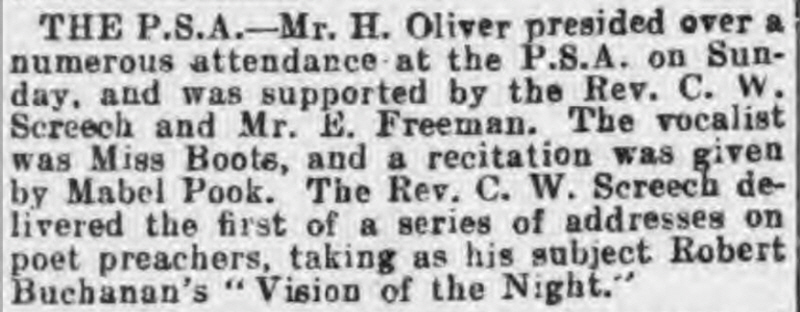 |
|||||||||||||
|
The Gloucester Citizen (15 April, 1904 - p.3) |
|||||||||||||
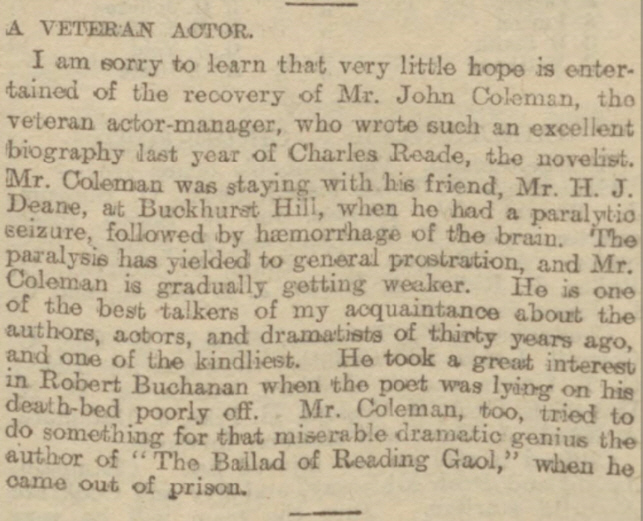 |
|||||||||||||
|
From Views of Men and Women of Note on the Vivisection Question. British Union for the Abolition of Vivisection. [London : The Union, 1906?] (Available from the Hathi Trust.) |
|||||||||||||
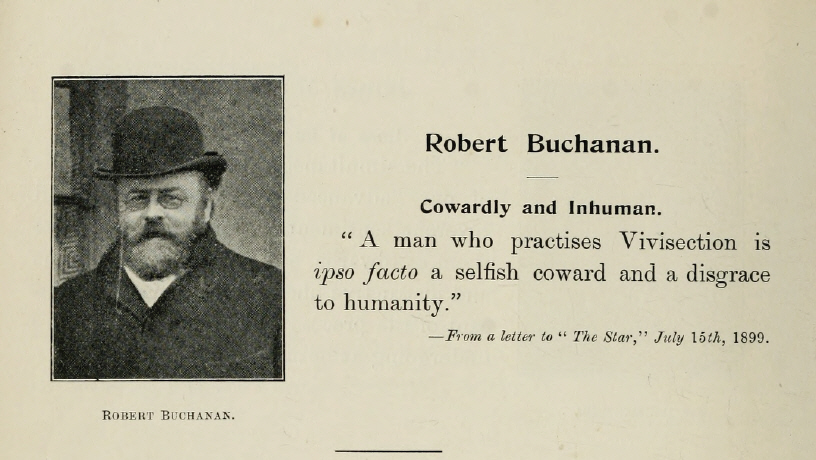 |
|
Western Daily Press (15 October, 1910 - p.4) “A Memoir of William Sharp,” in which Mrs Sharp endeavours to explain the dual personality of her husband as critic and biographer and “Fiona Macleod,” the poet of the Celtic movement, will be one of the books of the current month. It may be recalled that just before his introduction in 1879 to D. G. Rossetti, Sharp, who had sent some of his early literary efforts to Robert Buchanan, was frankly told by that poet that his work was devoid of any faculty or promise whatsoever. [Note: ‘In the other letter he wrote: ___
Scribners (August, 1912 - p.157) [An article entitled ‘Letters of George Meredith’ contains the following, in an undated letter from George Meredith to Algernon Charles Swinburne.] . . . Apropos, what do you think of Buchanan’s poetry? Lewes sends him up I don’t know how high. My feeling is that he is always on the strain for pathos and would be a poetic Dickens. But I can’t judge him fairly, I have not read his book. ___
Western Daily Press, Bristol (4 April, 1913 - p.5) The death was announced on Wednesday of Mr Byron Webber, the veteran journalist and author, at the age of 75, in Jersey, where he has been living in retirement for the last 10 years. He was the author of several novels, the monumental “James Orrock, R.I.,” and the patriotic verses, “Hands Across the Sea,” the latter prompting an enthusiastic letter from Robert Buchanan, until then a total stranger to the deceased journalist. ___
The Oban Times (15 November, 1913 - p.5) OBAN SCIENTIFIC AND LITERARY ASSOCIATION.—The weekly meeting of the Association was held in the rooms, Craigard Road, on Tuesday evening, when there was a fair attendance of the members, over thirty being present. The president delivered the opening address, the subject of which was “Robert Buchanan.” A brief sketch of the poet, novelist, and dramatist was given, and reference was made to his connection with Oban as tenant of “The White House on the Hill,” where much of his best work was done. The paper was followed by the customary discussion. At the outset the chair was occupied by Mr Duncan MacGregor, hon. president, and later by Mr David Stewart, vice-president. Next week Mr A. MacIntosh, M.A., contributes an essay on “Climatic Control.” ___
The Portsmouth Evening News (30 March, 1914 - p.5) |
 |
|
The Bioscope (5 October, 1916 - p.6) |
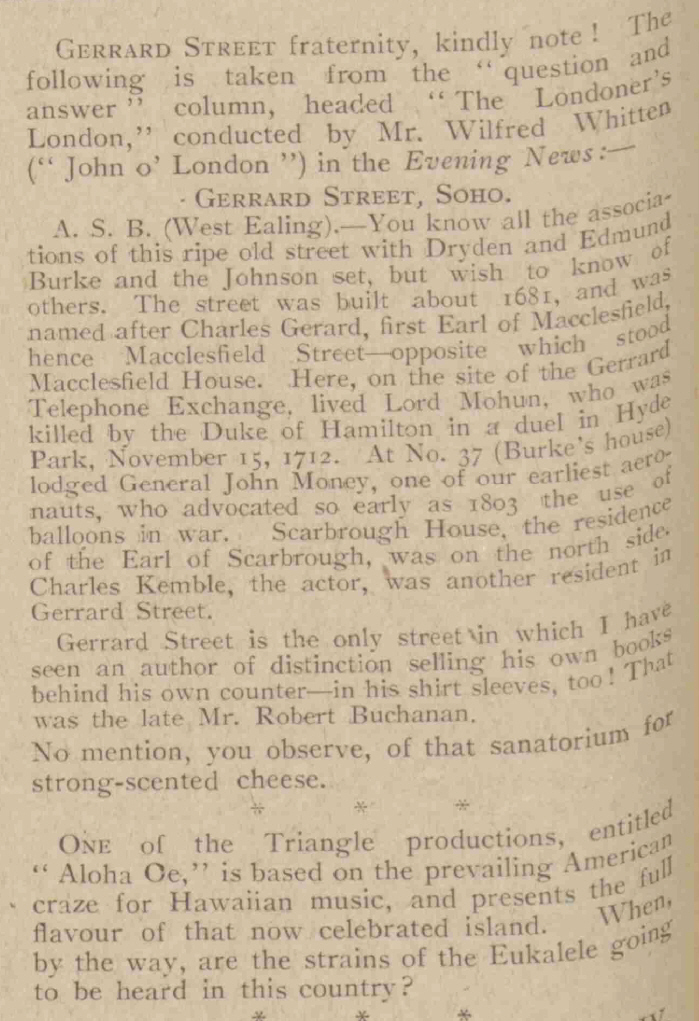 |
|
Pictures And The Picturegoer (3 March, 1917 - p.10) [I wasn’t sure where to put this - an interview with Daisy Cordell - since she was a member of James Welch’s company, playing Sarah Isaacson, in his original production of When Knights Were Bold, and she also played Astræa in the 1915 film of The Trumpet Call, so it’s ended up here.] |
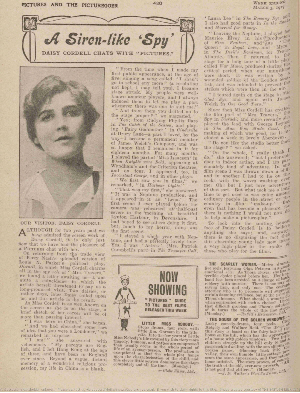 |
|
The Daily Mail (Hull) (6 July, 1917 - p.1) Sir Herbert Tree’s last letter was written to Miss Harriett Jay. It was written a few hours before his death and concluded: “I am doing splendidly. This enforced rest is a blessing in disguise.” ___
The Oban Times (28 September, 1918 - p.5) |
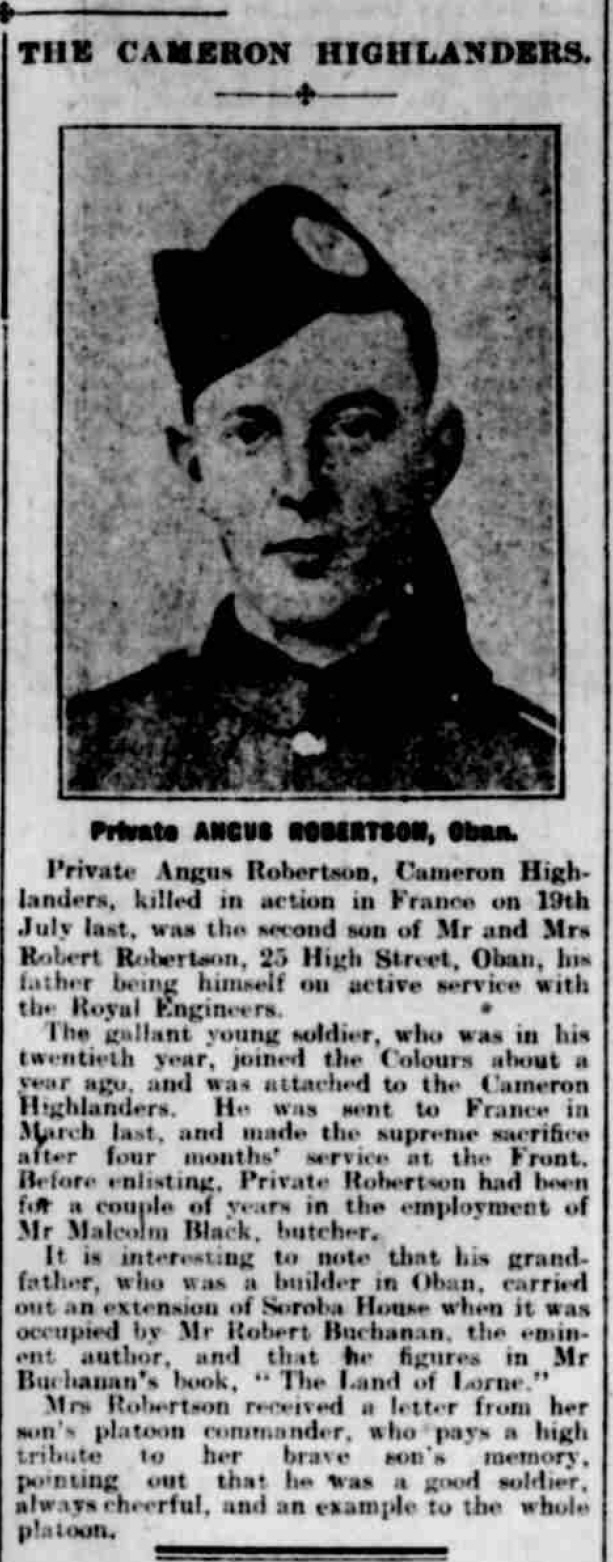 |
|
The Oban Times (23 June, 1923 - p.5) DR. SAMUEL JOHNSON AT OBAN. OTHER FAMOUS VISITORS. JOHNSON’S “TOLERABLE INN.” . . . Robert Buchanan. One more, and a pathetic last. In the opening of youth, and before the iron of sorrow and disappointment had made of his soul a charnel house of dead hopes, Robert Buchanan found grace in the “Land of Lorn.” From the “White House” on the hill he, too. must have passed the decaying walls of the Inn, going to and from his little yacht that carried him on that apocalyptic voyage to his “Hebrid Isles,”—I sorrow, if its parlour of 100 years old memory did not speed you in going and welcome you on return. Your soul journey, then begun, drifted toward isles less fair than your Canna or Thule! Would that your haven at last was Peace. [Note: The full article is available here.] ___
The Yorkshire Post (11 January, 1927 - p.5) |
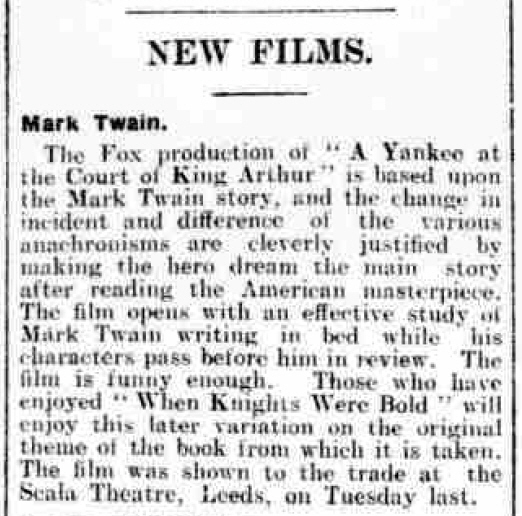 |
|
The Hull Daily Mail (1 February, 1927 - p.6) THE DEATH OF MISS MAY EARLE FORMER HULL LADY WHOSE POEMS . . . Other publications were:— [Note: ___
Cheltenham Chronicle and Gloucestershire Graphic (28 November, 1931 - p.10) |
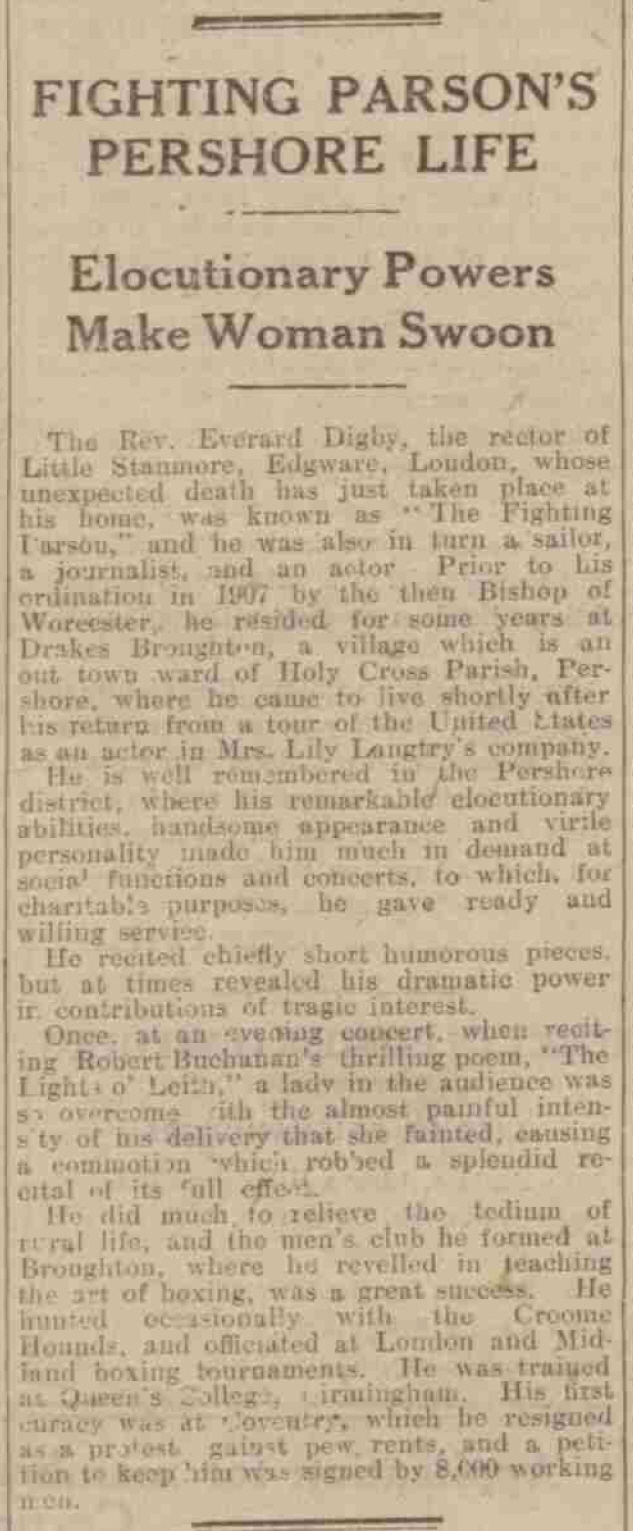 |
|
Aberdeen Press and Journal (1 December, 1932 - p.6) MANY SCOTTISH RARITIES . . . Among other “firsts” there are one or two Carlyles, one or two Arnolds, and a copy of Robert Buchanan’s “Fleshly School of Poetry,” 1872, the celebrated essay attacking Swinburne and Rossetti, a copy of which fetched 28s in Aberdeen the other day. ___
Aberdeen Press and Journal (3 March, 1933 - p.6) BOOK RARITIES to MAKE the . . . Still more modern volumes of interest are Robert Buchanan’s “Idyls and Legends of Inverburn,” 1865, and James (B. V.) Thomson’s “City of Dreadful Night,” 1880, both of them Scotsmen whose poetry deserves to be better remembered than it is; the “Poems” of Dante Gabriel Rossetti, 1870, with a letter from the author, a beautiful copy—this was the book that evoked Buchanan’s savage attack upon “Leg-Literature,” in “The Fleshly School of Poetry.” A scarce item is Adah Isaacs Menken’s “Infelicia,” 1868. She was a rather glamorous stage lady, an American, over whom Dickens went crazy and for whom Swinburne is supposed to have written “Dolores.” ___
The Dundee Courier and Advertiser (25 August, 1936 - p.7) |
 |
|
The Nottingham Evening Post (11 June, 1937 - p.5) |
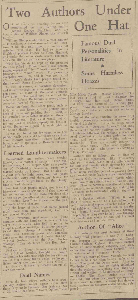 |
|
Aberdeen Press and Journal (28 August, 1937 - p.6) |
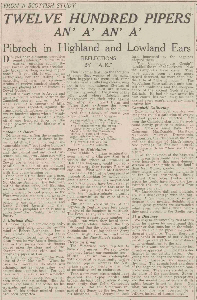 |
|
The Scotsman (30 December, 1940 - p.7) |
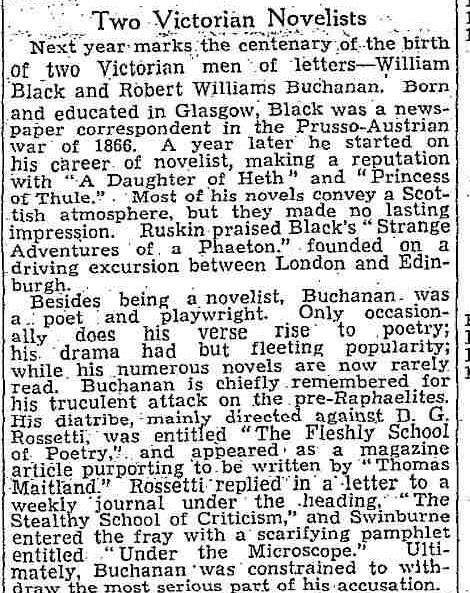 |
|
|
|
|
|
|
|
|